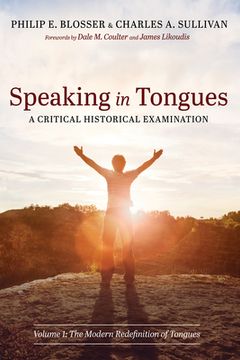Share
Speaking in Tongues: A Critical Historical Examination, Volume 1 (in English)
Philip E. Blosser
(Author)
·
Charles A. Sullivan
(Author)
·
Pickwick Publications
· Paperback
Speaking in Tongues: A Critical Historical Examination, Volume 1 (in English) - Blosser, Philip E. ; Sullivan, Charles A. ; Coulter, Dale M.
$ 29.47
$ 35.00
You save: $ 5.53
Choose the list to add your product or create one New List
✓ Product added successfully to the Wishlist.
Go to My WishlistsIt will be shipped from our warehouse between
Monday, June 10 and
Tuesday, June 11.
You will receive it anywhere in United States between 1 and 3 business days after shipment.
Synopsis "Speaking in Tongues: A Critical Historical Examination, Volume 1 (in English)"
In three carefully researched volumes, this ground-breaking study examines the gift of tongues through 2,000 years of church history. Starting in the present and working back in time, these volumes consider (1) the modern redefinition of ""tongues"" as a private prayer language; (2) the church's perennial understanding of ""tongues"" as ordinary human languages; and (3) the Corinthian ""tongues,"" which, in light of Jewish liturgical tradition, turn out to have been a foreign liturgical language (Hebrew or Aramaic) requiring bilingual interpreters. In the first volume, the authors establish that modern glossolalia, far from being a supernatural gift enjoyed by certain believers since the time of Pentecost and undergoing a resurgence in modern times, has no precedent in church life prior to the nineteenth century. They discuss why German theologians, responding to the Irvingite revival, coined the term ""glossolalia"" in the 1830s; why Pentecostals between 1906-8 quietly began redefining ""tongues"" to mean a heavenly language unintelligible to human beings but pleasing to God, instead of foreign languages useful for evangelism; why Protestant cessationists believed miraculous tongues had ceased; and why interpolated idioms like ""unknown tongues"" in Protestant Bibles were aimed originally at Rome's use of Latin.

